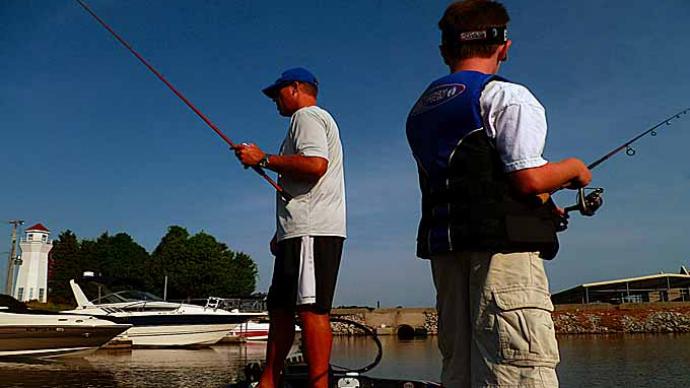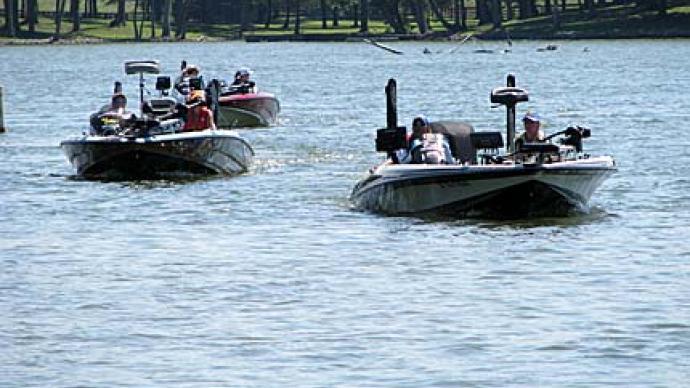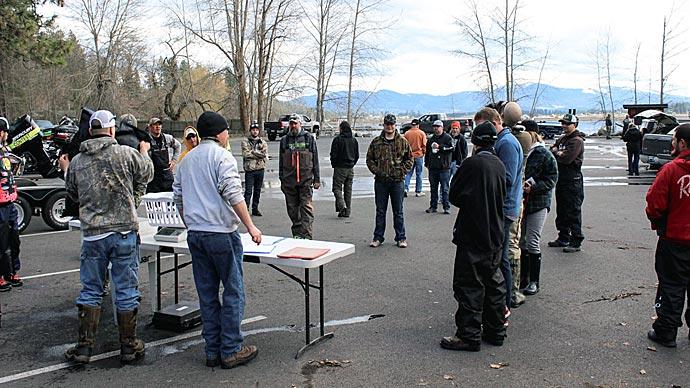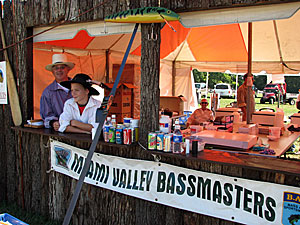
Finding and keeping bass club members is just like fishing. You win some; you lose some.
Like in fishing, the key to success is using the right tactics to ensure you catch and keep more than you lose. Two clubs that have been successful at this game for over three decades are the Miami Valley Bassmasters of Ohio and the Soo Bassmasters of South Dakota.
Steve Schultz, president of the Miami Valley Bassmasters, joined his club shortly after its organizational meeting 36 years ago. "We usually stay around 30 members each year," says Schultz. He estimates the club recruits about five to eight new members annually and loses two to three members annually.
When the Soo Bassmasters formed, Kyle Helseth, helped start the first federated club in South Dakota in 1975. The former South Dakota B.A.S.S. Federation Nation president estimates his club has gone through 300 anglers throughout the years and retained 30 "hard-core members." The club averages about 6 to 10 recruits each year and has a turnover ratio of about one-in-four.
Luring recruits
Clubs can recruit new members through a variety of venues. Schultz rates "word of mouth" as the number one way his club has attracted new members. "We have a bunch of guys who have just brought their friends to fish tournaments and learn more about bass fishing," says Schultz.
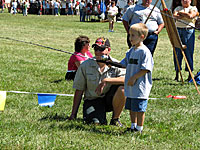
Participating in special events has also helped the Miami Valley Bassmasters' recruitment. The club usually mans a booth on Labor Day weekend for the Piqua Heritage Festival, which draws about 80,000 spectators. Holding CastingKids contests each day of the festival also draws the club's attention.
The Ohio club also draws in new members when it holds a CastingKids event at a local mall in January or February. "We always pass out quite a few cards and information packets," says Schultz.
Some anglers also joined the club when it used to sponsor a boat show for six years. However, the club had to discontinue the show when it had trouble finding a site. "We didn't' get as much recruitment there as we do at the CastingKids events," says Schultz.
Sports shows have been successful recruiting sites for Helseth's club. "Those have worked the best for us," discloses Helseth.
The club tries to meet and greet potential members wherever it can, such as by manning booths at malls or conducting CastingKids contests. While holding their tournaments, the Soo Bassmasters also attract curious onlookers who want to know more about the club. "We get a lot of that only because we are such an anomaly up here," says Helseth. "If it isn't walleyes in this area, some people wonder why you would fish for it. When people find out there are bass fishermen here, sometimes they stop you on the water and want to know how to catch largemouth."
Helseth believes his club also has a recruiting advantage since it is in a smaller state with a sparse population. "We can concentrate our efforts more," he says. "The bass fishermen in this state tend to stick out. By watching guys in the boat, you can pick out the walleye guys since they sit down and fish and the bass guys stand up. So if you're out on the water here, you can pick out a bass fisherman from a long way away."
Making a good first impression is a key to hooking new members. The Miami Valley Bassmasters invite potential members to sit in on their meetings. "Our meetings are pretty laid back, and we just make ourselves available to answer questions and make the guy feel at ease," says Schultz. "That seems to help more than anything."
The club has changed its policy over the years to convert invitees into new members quicker. "We used to have guys sit through a meeting, and then we would talk about them at the next meeting," says Schultz, "but in the last few years, if a guy comes there and we talk to him and answer his questions, then we vote on him."
Helseth believes "just being open and friendly" is the best way to impress potential members. "We try to get as many club members to the sports shows and CastingKids events as we can rather than just two or three guys," he says. "Those people are the club's best ambassadors. They can be walking around wearing their tournament shirts and answering questions. People tend to pick them out and talk to them."
His club also invites recruits to meetings and allows them to fish the club tournaments as guests. "Even if it goes against the insurance policy, you have to get members and let them see that we all put our pants on one leg at a time," suggests Helseth. He also recommends making the newcomers feel at home by including them in the meeting discussions and the story-telling sessions.
A direct sales approach is one recruiting tactic a club should avoid. "People have to want to join rather than being forced to join," warns Helseth.
Schultz believes honesty is the best policy when talking to recruits. "We've taken in guys and told them upfront what is involved and what it's going to cost," says Schultz. "We've had several guys tell us straight up that they can't afford it. Now with the fuel price, that will become even more of a problem."
The same issue has also cost the Soo Bassmasters some recruits lately. "It is not a cheap sport to get into," Helseth admits. "There is an investment there, and even though many people would like to do it, they just can't afford it."
Other factors that can influence whether a recruit joins your club include dues, club affiliations, the club's activities, and roster makeup.
"We don't require a lot in dues," says Schultz. The club's annual dues of $50 mostly pay for B.A.S.S. and Federation Nation memberships.
Anyone wanting to join a club can pick a non-affiliated club or chapter affiliated with the B.A.S.S. Federation or The Bass Federation (TBF). "Since the (Federation) split, some guys have called and asked if we were B.A.S.S. or TBF," says Schultz. He has noticed some newcomers joined his club because they were B.A.S.S. members and wanted to join a B.A.S.S. affiliated chapter.
Helseth and his fellow club members stress that recruits should join their affiliated club to reap the benefits of the B.A.S.S. Federation Nation. They believe the affiliated club gives newcomers a more structured environment for fishing at a state level, yet they can still opt for fishing locally.
A club gets plenty of name recognition that could help attract recruits when it participates in community activities. "A lot of guys have seen us at different events and thought they would like to do that, so they joined," says Schultz. Helseth believes a quarter of his club's members have joined after seeing the club participate in civic and conservation projects.
The Soo Bassmasters add new members to their roster by encouraging non-boaters to join. "We take anybody, no matter what make, model, or color they are," says Helseth, who has remained a non-boater throughout his years in the club. "I have had more fun as a non-boater just meeting new people. Most of the time, a non-boater will turn into a boater after two years when they realize there is a distinct advantage to being in the front of the boat."
Keeping members
"That is the tough part," says Helseth. "I don't know if there is a good way to do it because people grow and get different interests, and so do their kids. That is the ongoing struggle. You have to recruit new people and realize that you are going to only retain maybe one out of four. There is just too much other stuff for them to do."
Several clubs, including the Miami Valley Bassmasters, lose members for various reasons. "Sometimes it's just a change of life," says Schultz. "It's just some things going on in their personal life. We don't seem to have a lot of personality conflicts. I've been with the club for 36 years, and we have only had a few out of that time that has been a problem."
Some members have dropped out of the Miami Valley Bassmasters because they wanted to progress to the next level of competition. "They were looking at it more as a monetary issue, and if they were going to spend money to fish, they were going to go where they could win a couple of thousand dollars as opposed to just fishing a club tournament," says Schultz. Others have stayed with the club because they see an opportunity to compete in the Federation Nation divisionals (as Schultz did last year) and possibly advance to the Federation Nation National Championship and the Bassmaster Classic.
Maintaining an equal proportion of non-boaters and boaters helps retain club members. Schultz notes that some of his club's members who own boats had quit because they didn't want to fish from the back of a boat when the club lacked non-boaters for some of its tournaments.
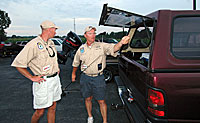
The Soo Bassmasters keep everyone happy by splitting tournament winnings evenly between the boaters and non-boaters. "Within our club, we have a boater's division and a non-boaters division," says Helseth. "So the non-boaters don't feel like they are always in the back of the boat and never have a chance to win anything. Their award is just as big as the boaters'."
Adjusting the tournament schedule and trying new bodies of water can also help retain members. "We must try new waters in our area because we are not like Minnesota or Michigan and have lakes everywhere," says Schultz. "We try to move our tournament sites and fish seven or eight tournaments yearly. We also try to accommodate some of the guys who work on weekends, so instead of having a tournament on a Saturday, we'll have it on a Sunday and vice versa."
Helseth suggests a club should try something different such as night tournaments, catch-and-release paper tournaments, or odd-fish tournaments. "Don't get stuck in a rut," warns Helseth, who also advises seeking out ideas from the newest club members. It always surprises me because they will come up with some great ideas and places to fish. You have to learn from everybody, making it much more fun."
Reprinted with permission from
Copyright John Neporadny, Jr. All Rights Reserved


